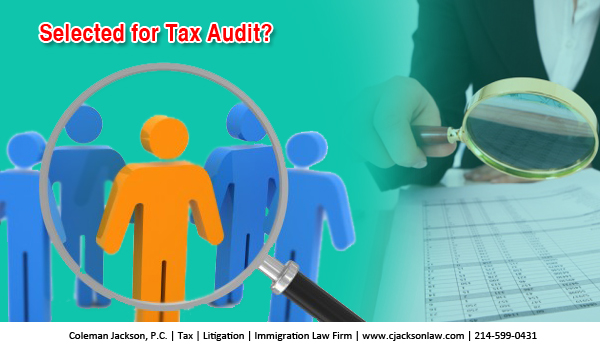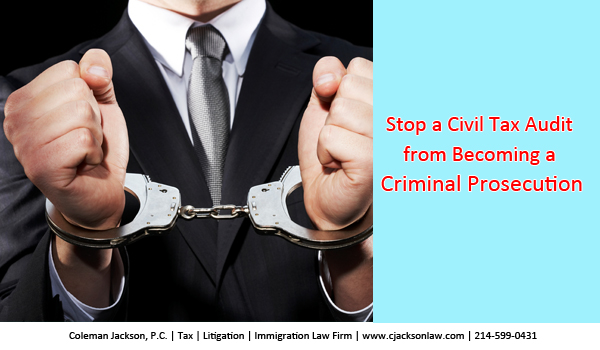How to Stop a Civil Tax Audit from Becoming a Criminal Prosecution
By: Coleman Jackson, Attorney, CPA
June 30, 2016
When the taxing authorities visits your home or business establishment, make sure you first get their business card(s) to determine who they are. For example, federal tax investigations are handled by the IRS’s Criminal Investigation Division (CID). If a Special Agent from CID visits you think the same way that you would if any law enforcement officer visited you at your home or business on official business. Anything that you say could possibly be used against you in a court of law. You need legal representation before you proceed with answering any questions because you could be inadvertently making admissions that can be used against you in a criminal prosecution. You must always be truthful when answering questions with a law enforcement officer whether the officer is your local police, or tax investigator with CID or criminal tax investigator with the Texas Comptroller of Public Accounts Office. Always keep in mind that non-compliance with federal and state tax laws can lead to civil penalties as well as criminal prosecution under some circumstances.
What kind of taxpayer conduct could turn a civil tax audit into a criminal prosecution? Tax fraud with the intent to evade federal and state tax statutes could lead to criminal prosecution in certain circumstances.
Historically the courts have developed certain, so called, badges of tax fraud. When the following badges of tax fraud exist; particularly if they establish a pattern of deceptive behavior, could lead to a criminal tax indictment under federal and state tax laws:
- Understating of income;
- Maintaining inadequate records;
- Implausible or inconsistent explanations of behavior;
- Concealing income or assets;
- Engaging in illegal activities;
- Failing to cooperate with tax authorities;
- An intent to mislead; and
- Filing false documents
When taxing authorities come knocking, it is important that taxpayers quickly learn who they are, be honest, up front and cooperative with the investigation or audit from beginning to end. Mere hiding the ball and being elusive and mean could potentially turn a civil audit into a criminal investigation. If the taxpayer has nothing to hide, why are they pushing back so hard when a tax examiner shows up at their door? Sometimes tax authorities go undercover. In these cases the taxpayer may not even know that they are being interviewed by a special agent of CID. Sometimes tax investigators for Texas and the U.S. government pose as purchasers, or buyers, or vendors, or some other gist. A tax counselor is a prudent business decision from the first hint of learning that the taxing authority visitor is from IRS’s CID or the correlating criminal investigation division of Texas. If there is any doubt as to the nature of the taxing authorities visit, tax counsel should be involved in that first encounter if at all possible.
This law blog is written by the Taxation | Litigation | Immigration Law Firm of Coleman Jackson, P.C. for educational purposes; it does not create an attorney-client relationship between this law firm and its reader. You should consult with legal counsel in your geographical area with respect to any legal issues impacting you, your family or business.
Coleman Jackson, P.C. | Taxation, Litigation, Immigration Law Firm | English (214) 599-0431 | Spanish (214) 599-0432



